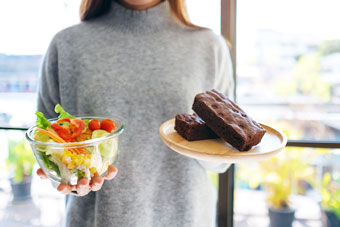 We all know we should eat a nutritious and balanced diet, but that doesn’t mean we always do it. For women, pregnancy is the most important time to make healthy eating a priority because the food you eat is nourishing both you and your baby. Eating a nutritious diet will help you feel good and encourage healthy development of the tiny person growing inside of you.
We all know we should eat a nutritious and balanced diet, but that doesn’t mean we always do it. For women, pregnancy is the most important time to make healthy eating a priority because the food you eat is nourishing both you and your baby. Eating a nutritious diet will help you feel good and encourage healthy development of the tiny person growing inside of you.
So what counts as a nutritious diet during pregnancy? Unfortunately, there’s a good chance that what your mom, friends, and even well-meaning strangers tell you to eat goes completely against the article you just read in a magazine. We know there is a lot of contradictory information out there, so we’re covering the basics.
Am I really eating for two?
Well, yes and no. You are eating for two, but that doesn’t mean you should double your calories. An average non-pregnant woman consumes 2,200 calories per day, and you only need to eat 300 extra calories per day during pregnancy. One extra snack will do it. A woman of average weight should typically gain 25-35 pounds throughout her pregnancy.
What should I eat while I’m pregnant?
Focus on eating a nutritious and varied diet of fruits and vegetables, whole grains, lean protein, and legumes. Your body especially needs important nutrients like calcium, protein, fiber, Omega-3 fatty acids, iron, and folate (folic acid) while you are pregnant. Many of us get into predictable routines when it comes to food, and you can make healthy eating more fun by trying new foods. The following are examples of healthy nutrition for pregnant women: broccoli, dried beans, lentils, poultry, oranges, bananas, pasteurized milk, fortified cereal, cooked eggs, nuts, oatmeal, leafy greens, pasteurized cheese, and whole-grain bread.
And don’t forget to drink lots of water! Your body needs more fluids while you’re pregnant, and you should drink 8-12 eight-ounce glasses of water each day. If you don’t like water, try adding a slice of lemon or lime to add flavor.
Are there special instructions for certain foods?
Yes, pregnant women should follow these guidelines:
- Eggs: Store them in the refrigerator and cook until the whites and yolks are firm. We recommend avoiding foods that contain raw eggs (Caesar salad dressing, cookie dough, etc.).
- Hot dogs and lunch meat: It’s okay to have one serving of regular hot dogs and lunch meat per week, but many grocery stores also carry nitrate-free hot dogs and lunch meat, and you don’t need to limit your intake of nitrate-free meat products. Ideally, all of these meats should be heated to kill bacteria that can cause food borne illness.
- Fish: It’s okay to have one serving of cooked fish per week, although some fish such as swordfish, shark, and king mackerel should be avoided completely because of high mercury levels.
- Sprouts: Cook them before eating. Raw sprouts can be a source of food borne illness.
- Cheese: We recommend eating pasteurized cheese only. Brie, goat cheese, feta, and bleu cheese are usually non-pasteurized, so we recommend that you avoid them. If you do find pasteurized versions of these cheeses, they are safe to eat.
- Caffeine: Limit your consumption to less than 200 mg per day. It’s ok to have one soda, one cup of tea, or a half cup of regular coffee per day.
- Herbal supplements: We recommend that you talk to your doctor before taking herbal supplements during pregnancy.
What foods should I completely avoid while I’m pregnant?
- Avoid eating undercooked meat and sushi and exotic fish (swordfish, shark, mackerel).
- Avoid the non-pasteurized forms of cheese, milk, eggs, and juice.
- We recommend that you avoid the sweetener saccharine and limit aspartame-containing foods and drinks to one serving per day.
- Avoid alcohol, tobacco, and recreational drugs.
What vitamins should I take while I’m pregnant?
- Vitamin B9 (Folic Acid): Take 0.8 mg per day, which is included in prenatal vitamins. Folic acid helps prevent birth defects of the brain and spinal cord, and it is very important to take a vitamin with folic acid in the first weeks of pregnancy or even when trying to conceive. Include foods that contain folic acid in your diet: green leafy vegetables, orange juice, peas, beans, peanuts, fortified cereals, whole wheat bread.
- Calcium: Include foods that contain calcium in your diet: green leafy vegetables, low-fat milk, yogurt, soybeans, salmon, navy beans, broccoli, sesame seeds. If you are lactose intolerant or do not consume at least 1,200 mg of calcium per day, you may need a calcium supplement. Your doctor can help you decide whether or not you need a supplement.
- B12: This vitamin is found naturally only in animal foods. If you are a vegetarian or a vegan, you may need a B12 supplement. Your doctor can help you decide whether or not you need a supplement.
We hope this helps clear up some confusion about nutrition during pregnancy. Be sure to ask your doctor any specific questions you have about nutrition. Eating a healthy diet can be a challenge for many people, but keep in mind that eating a nutritious and varied diet during pregnancy is one of the best things you can do for yourself and your baby. It’s worth it!
